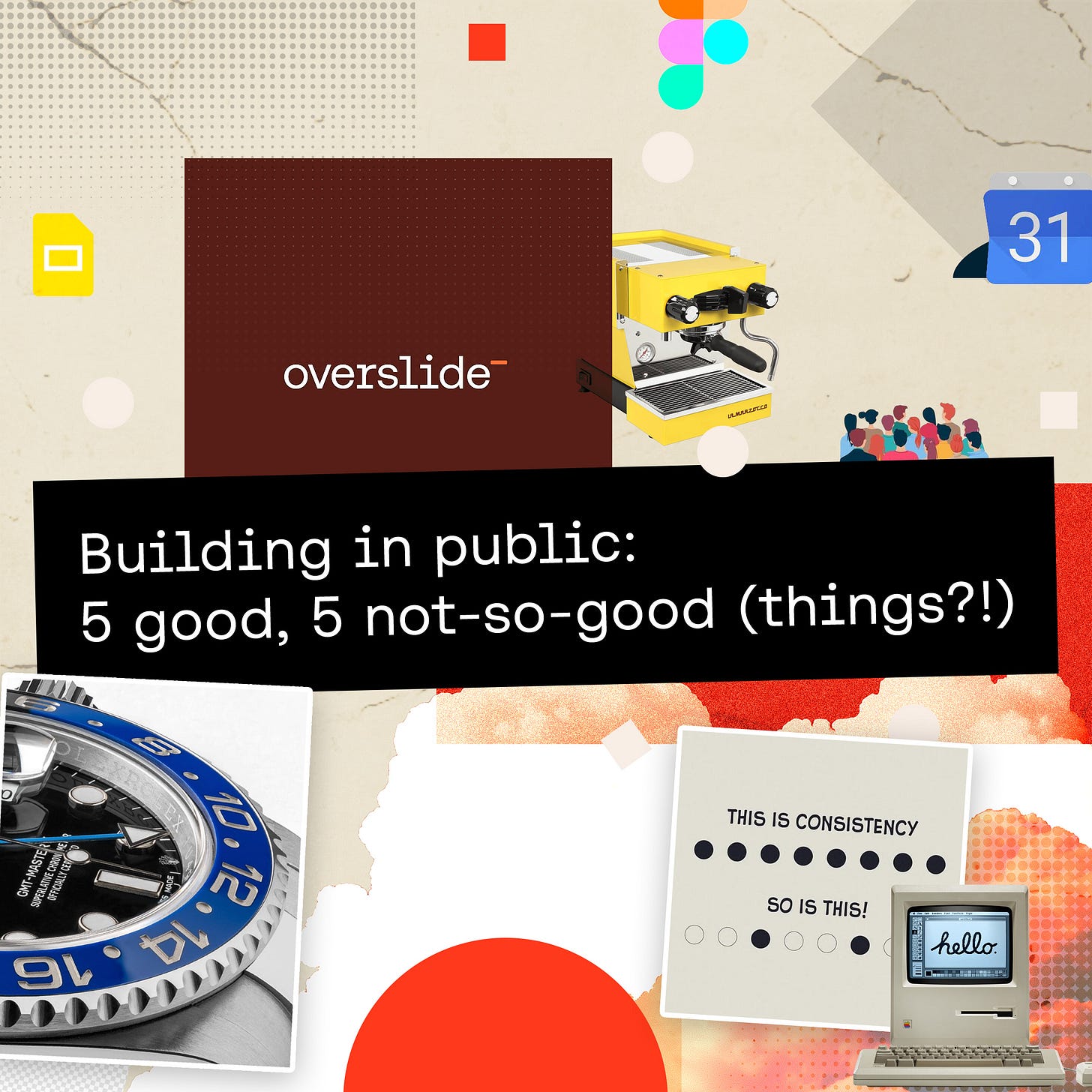Building in public: 5 good, 5 not-so-good (things?!)
Building Overslide S1, Ep 10: Some thoughts after 9 episodes, and skipping one.
Sometimes you get writer's block because of a slow week or because your attention was diverted to other things. This is that sometimes. It's been a very hectic couple of weeks, with work and life. Work was more on the GP side of things; life has everything to do with real estate, which fucking ate up all my time, life, energy, and tacos (but that's a story for another time).
This has had me reflect on my commitment to writing weekly and building in public. I actually missed publishing an article last week (now you know). And it created some anxiety.
Which conveniently leads me to the no. 1 "not-so-good" thing about building in public (yeah, starting with the bad to end on a good note):
The not-so-good side of building in public
Pressure about having to write/publish content even if things are moving slowly or your attention is diverted to another area. For one, you don't want to keep complaining about not having time, but you don't want to keep writing meta stuff (like this one :P). The reality is, you can skip a post just like you can skip a workout at the gym; as long as you get back at it. This is all part of consistency.
You edit your reality for content. I catch myself framing setbacks as "learning opportunities" when really they're just fucking setbacks. The urge to make everything into a lesson is strong, and it sometimes feels forced. It's artificial. Not everything needs to be a post.
You inevitably look at the performance for each article. Back in the day, I had a decently successful Instagram account focused on photographing watches (the black dial something). It was super fun in the beginning, and I've met fantastic people through it, with whom I keep in touch to this day. After a couple of years, though, I got burnt out. I ended up focusing on numbers (views/likes), and creating more content that resonated with the audience, rather than the stuff I enjoyed. The irony is that the latter is what makes you unique. Now, with this Substack, I force myself not to look at the numbers. I don't care if one or 100 people are reading this; I write this for myself. And hope that the shit I write about brings some value to people.
Speaking of the audience, you start attracting the "wrong" one. Initially, you think about building in public as a marketing tool to help you attract potential customers. In reality, you attract more people interested in building their business, rather than needing help with decks. Nothing wrong with that, per se; it's just something you have to adjust to (like the dude buying a nice car to attract women and ends up being surrounded by other dudes admiring the car.) Nonetheless, if I can bring value to someone, I'll happily take that over attracting customers.
Success feels somehow diminished. When you document everything, the private victories lose some impact. Landing your first client feels different. It's something you expected to happen, because it's part of the journey; you know you're going to write about it, versus just celebrating with your partner over dinner. Take a step back and raise that glass of bubbles.
Admittedly, these aren't really bad things, but for clickbait reasons, I could call them that. Talk about performance...
Now onto the good part.
The good about building in public
It forces you to actually think (which is a first for me). Writing about decisions makes you examine them. I've caught myself in contradictions, spotted blind spots, and clarified thinking just by trying to explain it to you. The act of documenting is like having a business therapist who never sends a bill (otherwise I'd be broke af).
It creates unexpected opportunities. The GP clients who said yes to free Overslide work? Direct result of these posts. Friends asking for deck help? Same thing. Building in public is networking without the networking events and forced small talk (and you can still drink in front of your computer).
It builds credibility through honesty. Admitting I fucked up that sales call probably did more for my reputation than any case study would. People trust you more when you show the messy parts, not just the highlight reel. So I'll keep telling it like it is.
It keeps you accountable (sort of). It's fucking harder to quit when people are watching. Not impossible, but harder. Public commitment creates just enough social pressure to push through the "maybe I should just focus on GP" moments. Thanks for the pressure :P.
Content that actually serves your audience. Instead of generic "5 tips for better presentations," I'm sharing real examples, real failures, and real processes. The content is better because it's coming from actual experience, not just coffee shop theories.
The Verdict
Would I do it again? Probably. Most definitely.
The biggest surprise? Building in public doesn't make building easier. It makes it different. Sometimes better, sometimes worse, always more complicated. I don't like complicated, but complicated likes me.
If you're thinking about doing this yourself, know that it's not just about transparency. It's about turning your business into content, your failures into entertainment, and your wins into case studies. And insecurities into bubbles. Let's not forget about bubbles. That changes how you relate to the work itself.
As always, still figuring this out (in public, obviously).
-Max
PS. Bubble brunch, anyone?


